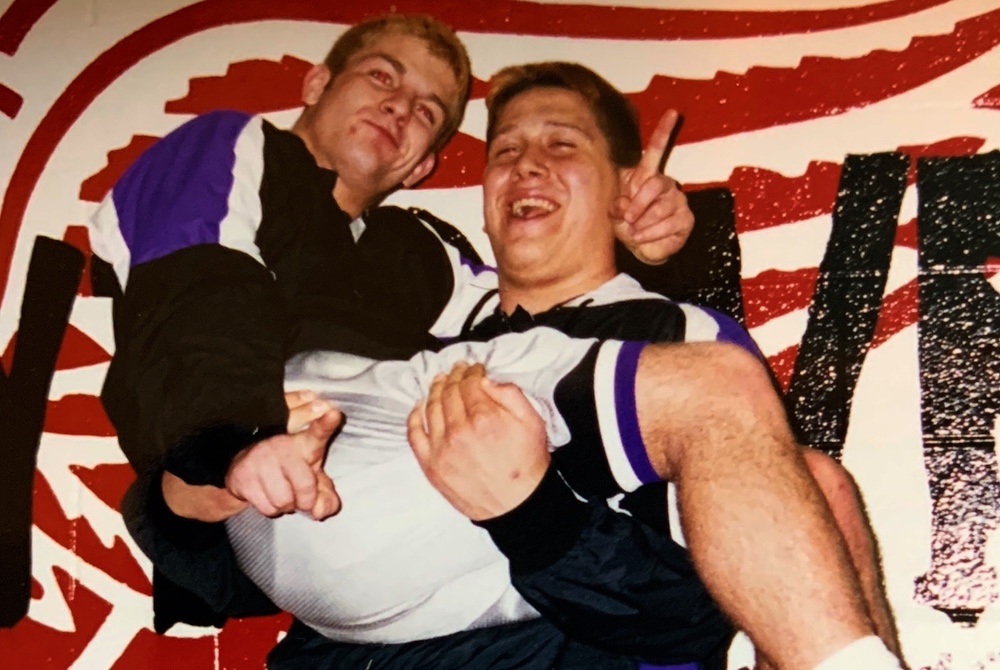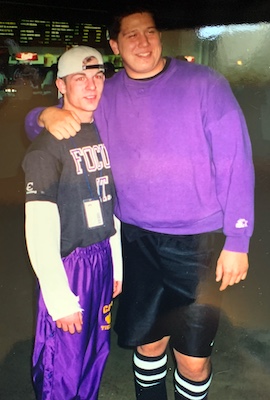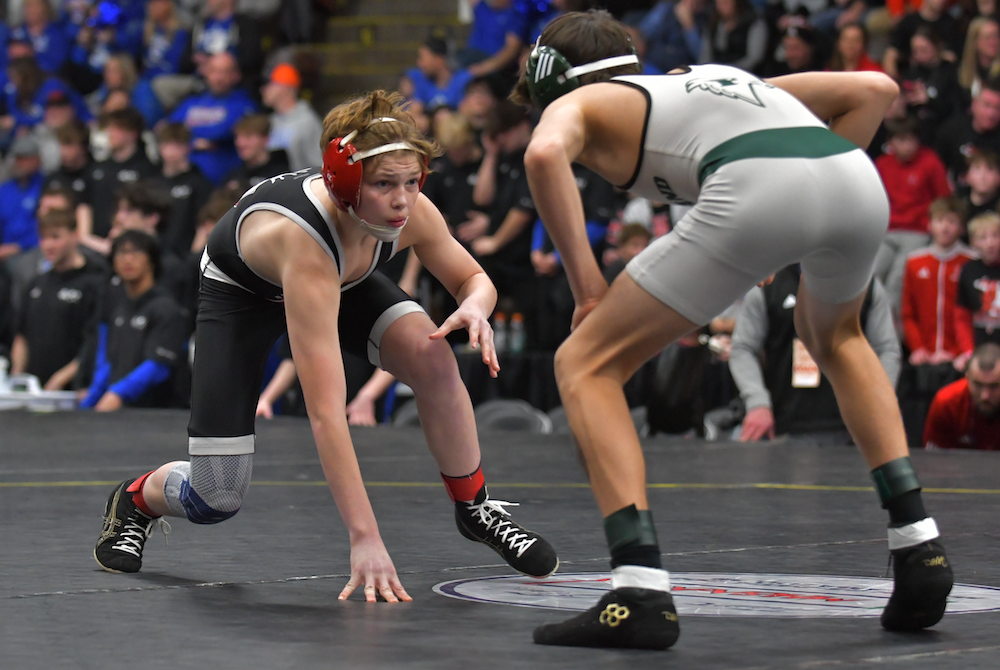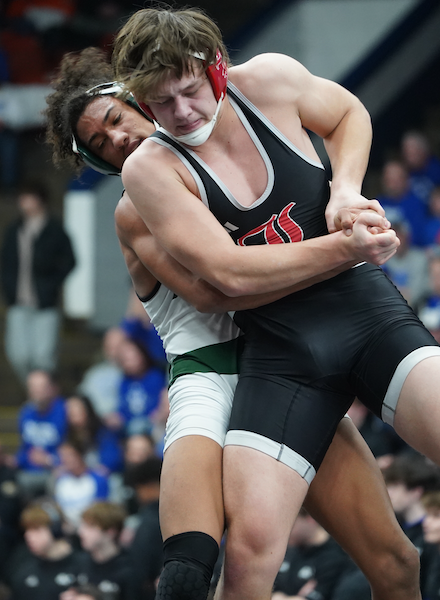
Caro Champs Find Common Ground Again as Mental Health Providers
By
Paul Costanzo
Special for MHSAA.com
July 8, 2021
Phil Millerov and Phil Niklowicz wanted to do more than simply defeat opponents when wrestling at Caro High School.
They wanted to dominate – physically and mentally.
 “We had this thing between us where we wanted to be done, and (opponents) didn’t want to come back on the mat with us,” Millerov said.
“We had this thing between us where we wanted to be done, and (opponents) didn’t want to come back on the mat with us,” Millerov said.
Twenty years later, both spend their days building people up. Millerov is a licensed professional counselor, while Niklowicz is a licensed therapist.
“I went out there looking to dominate and make sure it was known that I am the superior wrestler in all facets,” Niklowicz said. “I would try to run up as many points as fast as I can. I would teach the same thing when coaching, specifically with my nephew. You’re saying, ‘Listen, we want to break these people.’ Then the next day, in a therapy session, it’s like, ‘Let’s build up your self-esteem and set some goals to boost ourselves up.’”
The close friends and two faces of Caro’s surging wrestling program in the late 1990s now have very similar careers. Millerov – who finished second, third and first at 275 pounds in the 1998, 1999 and 2000 MHSAA Finals, respectively -- works in private practice at Transitions Counseling Service in Greenville, where he specializes in substance abuse disorders. He also has served as a Class 1 Fellow at the WK Kellogg Foundation.
Niklowicz – a two-time MHSAA Finals champion (1999 and 2000) and four-time placer – is working in private practice in Southfield, seeing mostly children. He also works in adult foster care with patients who have had traumatic brain injuries.
“He and I went and hiked Pictured Rocks at the beginning of May,” Millerov said. “And we joked about how nobody would have guessed that we’d be doing this now.”
That Millerov and Niklowicz are still close does not come as a surprise. Their friendship began when their wrestling careers did, as 6-year-olds in the Caro Growlers program. As they were becoming two of the state’s top wrestlers, they would share rides to tournaments, and their families grew close.
In high school, despite their size difference – Niklowicz wrestled at 135 his senior year – it wasn’t uncommon to see them warming up together.
“We were definitely easy going and liked to mess around a lot,” Niklowicz said. “We used to mess around before meets and throw each other. He would jump and I would throw him. People would look at us like, ‘Why is that little guy throwing that big guy?’”
 While their teams never made it out of the Regional, Millerov and Niklowicz helped set the stage for a program that would become among the best in Division 3 throughout the 2000s, qualifying for five straight Quarterfinals from 2003-07 and winning the Division 3 Finals title in 2003.
While their teams never made it out of the Regional, Millerov and Niklowicz helped set the stage for a program that would become among the best in Division 3 throughout the 2000s, qualifying for five straight Quarterfinals from 2003-07 and winning the Division 3 Finals title in 2003.
Individually, they were among the most well-known and feared wrestlers in the state.
“Niklowicz and I were fortunate to have each other, because we pushed each other,” Millerov said. “We were in constant competition with each other and ourselves. Just to kind of push each other, it was a great thing.”
Niklowicz finished fifth as a freshman and third as a sophomore before winning back-to-back titles to close out his career. In 1999, he defeated Nick Oertel of Goodrich 9-2 in the 125-pound final, and the next year he defeated Oertel’s teammate, Ryan Tripp, 7-5 at 135. Tripp would go on to win an individual title the following year. Niklowicz would finish his career with 214 victories.
“I think probably both (Finals titles) were equal,” Niklowicz said. “I think there was probably a little more stress going into my senior year. My motivation always came from improving, then it was maintaining the state title. You don’t want to go the opposite direction.”
Millerov lost a tight 6-4 decision against Remus Chippewa Hills’ Bob Kozlowski in the MHSAA Finals as a sophomore, and had an epic 12-10 match against future NFL defensive lineman Jason Babin of Paw Paw in the 1999 semifinals before fighting back to take third. The next year, he won his title via first-period pin against Dan Kliphuis, a two-time runner-up from Grand Rapids West Catholic. Millerov finished with 196 career wins and set the state record for pins in a career (160), which was broken the next season by Nick Simmons of Williamston and is now held by Justin Zeerip of Hesperia. The 56 pins Millerov recorded his senior season remains second all-time to Simmons, who had two seasons with 57.
“I never really thought about (the pin record) to be quite honest,” Millerov said. “It was just kind of in the background. It didn’t matter; all I cared about was winning this match, and I wanted to do it in the most effective, efficient way I could.”
They both continued their wrestling careers, but went their separate ways in college, with Millerov heading to Neosho County Community College in Kansas and Niklowicz to Virginia Tech.
Millerov had interest from several Division I schools coming out of high school, including some in the Big Ten, but he admits his grades weren’t good enough at the time. Neosho provided a chance to compete with some of the best in the country while at the junior college level, however, as the team took second at the National Junior College Athletic Association championships in 2002.
He transferred to Central Michigan after his sophomore year, joining his girlfriend – now his wife – who was already attending, and walking onto the wrestling team. While his relationship lasted, wrestling did not.
“I was distracted,” Millerov said. “My grandmother passed away in 2002 in that summer. I was trying to get that motivation back, and I just lost it. There has to be that edge with wrestling. When things didn’t work out, I struggled. Wrestling was my identity.”
Millerov was working to follow in his father’s footsteps and become a police officer. But the elder Phil Millerov, who died in 2012, talked his son out of it.
“Looking back on it, for me, it was obviously the right decision,” Millerov said.
The idea to go into counseling came after Millerov was married in 2006, as his wife had gotten into the program. He went back to school to earn his bachelor’s degree from CMU in 2007, and would go on to get his master’s from CMU, as well.
“I had taken a bunch of psychology courses just because I liked the field,” Millerov said. “I liked to be challenged. I liked puzzles, and with psychology, it’s like a new puzzle every hour. It just clicked. I flew through and graduated with like a 3.8. I was like, ‘Wow, I kind of feel smart.’ It was good to find something I was passionate about again.”
Millerov said he’s constantly learning and honing his craft, much like he did as a wrestler. A major difference now, however, is that he’s found more balance in his life.
“I think about working with athletes in addiction, I find a lot of similarities,” he said. “Wrestling was my life, it’s how I identified myself. I hear that same kind of talk around people struggling with addiction. One you’re considered successful for, the other you’re not. Most of my growth has been around finding balance. I find that my happiness and my clients’ as well, is when we found that balance instead of being good at just one thing. I want you to have passion, I want you to do things you love, but I also want you to be effective as a husband, a father, whatever other responsibilities you have.”
 Niklowicz’s journey to becoming a therapist was more telegraphed, as both of his parents work in mental health, and he said it was always something he wanted to do, as well.
Niklowicz’s journey to becoming a therapist was more telegraphed, as both of his parents work in mental health, and he said it was always something he wanted to do, as well.
He attended Virginia Tech on a wrestling scholarship, but transferred to Eastern Michigan after one year. The Hokies had recruited him to wrestle at 133 pounds, but when the team’s 125-pounder was injured, Niklowicz was asked to cut down further. Like Millerov, he struggled when his wrestling career ended.
“I just had a really bad taste in my mouth after leaving Virginia Tech and trying to cut all this weight,” he said. “Some of it was I had lost the desire to work out, to wrestle. Fifteen years, roughly, of my life was dedicated to wrestling, and once you stop, what do I do with my winters? What do I do with seven months of the year? It was definitely a part of my identity; that’s why I got into coaching. I did MMA fighting for a little bit to have something competitive.”
Like Millerov, Niklowicz said finding balance was important.
“In the mental health field, specifically, there’s a lot of burnout for people,” he said. “Every day, you’re listening to people talking about their problems, but at the same time, they’re coming for a reason and they’re there for help, so you have to provide that help and have to motivate yourself to come to the office every day and give it your best. I try to instill the motivation that I used to other people.”
When Niklowicz looks at his time as an athlete compared to his work as a therapist, he said that work ethic is the main characteristic that has carried over.
“I think my practice mentality was the same as it was on the mat,” he said. “Even in the wrestling room, these are people I’m friends with, people I grew up with, and I still didn’t want anyone to score on me. Then you just look at your work ethic outside of wrestling, whether you’re studying for exams or motivating yourself to get up and go to class.”
While they are no longer living in the same town or living similar lives – Millerov is married with three kids, while Niklowicz is single – the connection between Caro’s dominant duo remains strong, both professionally and personally.
“I don’t think we ever thought we would be going down such a similar path, and I doubt that either one of us grew up thinking we would do the exact same thing,” Niklowicz said. “We met when we were 6 years old, and we’ve been best friends forever. I think it’s hilarious that we’ve taken such similar paths but with some glaring differences. It’s definitely interesting that we’re still really good friends after 30-some years, especially since we’ve moved on and gone our separate ways.”
2020-21 Made in Michigan
June 28: Michigan's Minor Leaguers Making Up for Lost Season - Read
PHOTOS: (Top) Caro’s Phil Millerov lifts teammate Phil Niklowicz as both celebrate Division 3 championships during the 2000 Individual Finals at Joe Louis Arena. (Middle) Niklowicz, left, and Millerov were high school warm-up partners despite wrestling at significantly different weights. (Below) Niklowicz and Millerov take a selfie during a hiking trip to Pictured Rocks National Lakeshore in May. (Photos courtesy of Niklowicz and Millerov.)

Lowell Enters Another Elite Group of Champs with 11th-Straight Finals Win
By
Paul Costanzo
Special for MHSAA.com
February 24, 2024
KALAMAZOO – There’s nothing quite like the roar of a crowd after your team has clinched an MHSAA Team Wrestling Finals title.
That’s true whether it’s for title No. 1, or, in the case of Casey Engle and his Lowell teammates Saturday, for their program’s 11th-straight Division 2 championship.
“It’s unreal,” Engle said. “It’s something I look forward to every year.”
Lowell extended its record run of wrestling team titles by defeating Freeland 49-21 in the Division 2 Final at Wings Events Center.
The Red Arrows joined the Grosse Pointe South (1976-86) and Grosse Pointe Woods University Liggett (1980-90) girls tennis programs in winning 11 straight Finals titles. Only East Grand Rapids boys swimming & diving, winning 15 straight from 1948-62, and Bloomfield Hills Brother Rice boys lacrosse – with 13 straight from 2005-17 – have longer Finals championship streaks in Lower Peninsula or statewide competition.
“I mean, it’s possible (to reach 15),” said sophomore Jarrett Smith, whose pin at 106 pounds clinched the title. “It’s hard to predict that far, four years into the future. We’re losing some key guys, but we graduated 14 last year, five this year, so we’re returning some firepower.”
Lowell is always returning firepower, and it’s consistently adding it, too, giving new waves of Red Arrows the chance to raise a wooden mitten.
That’s why for coach RJ Boudro, each title remains just as sweet as the last.
“Why would it get old?” said Boudro, who has been in charge for 10 of those titles. “Look at the crowd. When I first walked in here, I looked up, and you see that we have more fans here than anybody else, and that’s what it’s about. Next year will be fun, too. When you can still bring crowds in and you can do it 11 years in a row, there’s more to that than just winning. If it was just about winning, why else would they come? They would probably think it was a foregone conclusion. They love the kids; they love the community.”
One could forgive an outsider for believing it’s a foregone conclusion when Lowell takes the mat for the Division 2 postseason, as it’s won the Final by more than 20 points in each of the past five seasons and in seven of its 11 straight championship victories.
 So to avoid that feeling creeping into his wrestling room, Boudro makes it clear the Red Arrows’ responsibility isn’t just to win on the mat, but to strive for something bigger.
So to avoid that feeling creeping into his wrestling room, Boudro makes it clear the Red Arrows’ responsibility isn’t just to win on the mat, but to strive for something bigger.
“We’re not doing it to just win state championships,” Boudro said. “We’re trying to find out who we are, we’re trying to be better men, better women, better coaches. So, it’s not just about winning, it’s about being a better person. Whether I’m a coach or a kid, just trying to find a way to be better. When you’re doing that all the time, you get better, but you feel like you have a purpose. Every single guy on the team feels like they have a purpose, and that’s really important.”
Just 14 wrestlers can step onto the mat in a single dual, and the same number is the max a team can enter into the individual postseason, so accomplishing that can sometimes be as tough as anything else for Lowell wrestlers, and certainly helps motivate them throughout the season – foregone conclusions or not.
“One of our signs up there I saw, it says, ‘Tradition never graduates,’ and it’s true,” Smith said. “We just keep the kids coming. Even our B Team, C Team are competing at the highest level. At the beginning of Districts, we had 17 ranked guys, and you can only send 14. So we have just great partners all around.”
Freeland, meanwhile, was making its first appearance in a Final, after getting to the Quarterfinals for the third time in program history.
“Outstanding. Outstanding. They’ve been giving their all every match,” Freeland coach Scott VanLuven said. “They’ve been doing it all year. We beat Brighton, we weren’t supposed to. We beat (Bay City) John Glenn in our conference, then we had to beat them again in our District Final when we weren’t supposed to. No one gave us really a chance down here, I think. But they believed, and they did well.”
The Falcons (25-3) still had a shot with three matches to go, trailing 31-21. But Smith put a quick end to that with his pin at 106, and that was followed by a pair of pins from Cole and Carter Cichocki at 113 and 120, respectively.
Of the Arrows’ nine wins in the dual, eight came by either pin or technical fall, as Jackson Blum (138), Jared Boone (165) and Engle (190) also won by pinfall. Logan Dawson (132) and Owen Segorski (144) each won by tech. Cody Foss (126) opened the dual with a win by decision for Lowell (22-3).
Fabian Facundo (150) and Bringham Smith (285) each won by pin for Freeland, while Noah Graham (157), Gibson Shepard (175) and Elijah Murphy (215) all won by decision.
PHOTOS (Top) Lowell’s Cole Cichocki, left, lines up against Freeland’s Michael Wilson at 113 pounds Saturday. (Middle) The Falcons’ Elijah Murphy, left, locks up Lowell’s Ari McFarland at 215. (Click for more from High School Sports Scene.)

